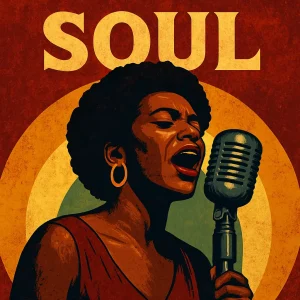What Is Soul Music? A Genre Rooted in Spirit and Struggle
Soul music is one of the most emotionally powerful and culturally significant genres in modern music. Born in the mid-20th century from the fusion of gospel, rhythm and blues (R&B), and jazz, soul became a musical voice for African American communities and a vehicle for personal expression, spiritual intensity, and social commentary. With its heartfelt vocals, rich melodies, and deep grooves, soul music continues to influence countless artists and genres to this day.
The Origins: Where Gospel Meets Rhythm and Blues
The origins of soul music can be traced to the 1950s in the United States, when African American artists began blending sacred gospel music with the secular sounds of R&B. Gospel brought the raw vocal intensity and spiritual fervor, while R&B added groove, rhythm, and sensuality. This hybrid style captured both the joy and pain of Black American life. Therefore creating a deeply expressive form of music that resonated with a wide audience.
One of the earliest pioneers was Ray Charles, often called “The Genius,” who broke new ground by merging gospel-style vocals with secular lyrics and bluesy arrangements. His 1954 hit “I Got a Woman” is widely regarded as one of the first soul records. Sam Cooke, another gospel singer turned soul pioneer, helped define the genre with his smooth voice and crossover appeal. Songs like “You Send Me” and “A Change Is Gonna Come” became timeless anthems of love and civil rights.
The Golden Era: 1960s and 1970s Soul
By the 1960s, soul music had become a dominant force in American popular culture. Labels like Motown Records in Detroit and Stax Records in Memphis helped bring soul music to a broader audience. Motown, led by Berry Gordy, produced stars like Stevie Wonder, Marvin Gaye, Aretha Franklin, and The Supremes, combining catchy melodies with socially conscious themes and polished production.
Meanwhile, Southern soul from Stax and Atlantic Records had a grittier, more gospel-influenced sound, driven by artists like Otis Redding, Wilson Pickett, and Booker T. & the M.G.’s. These recordings often featured horn sections, gospel-style backing vocals, and emotionally charged performances that defined the era.
The Evolution of Soul: Funk, Neo-Soul, and Beyond
As soul music matured, it began to branch into other styles. In the 1970s, artists like James Brown and Sly and the Family Stone introduced funk — a rhythm-heavy evolution of soul with an emphasis on groove and social commentary. This paved the way for genres like disco, hip-hop, and modern R&B.
In the 1990s and 2000s, soul experienced a revival through neo-soul. A genre that honored classic soul while blending in contemporary hip-hop, jazz, and electronic influences. Artists like Erykah Badu, D’Angelo, Lauryn Hill, and Maxwell brought soul’s emotional honesty into a new millennium.
A Timeless Legacy
Soul music is more than a genre — it’s a cultural legacy rooted in resilience, love, faith, and freedom. Its impact can be felt across nearly every style of popular music, from R&B and hip-hop to pop and rock. With its ability to touch hearts and inspire change, soul continues to be a timeless expression of the human spirit.
Whether in the stirring vocals of Aretha Franklin or the smooth production of a modern-day neo-soul track, soul music lives on. A genre born from struggle and uplifted by passion.
